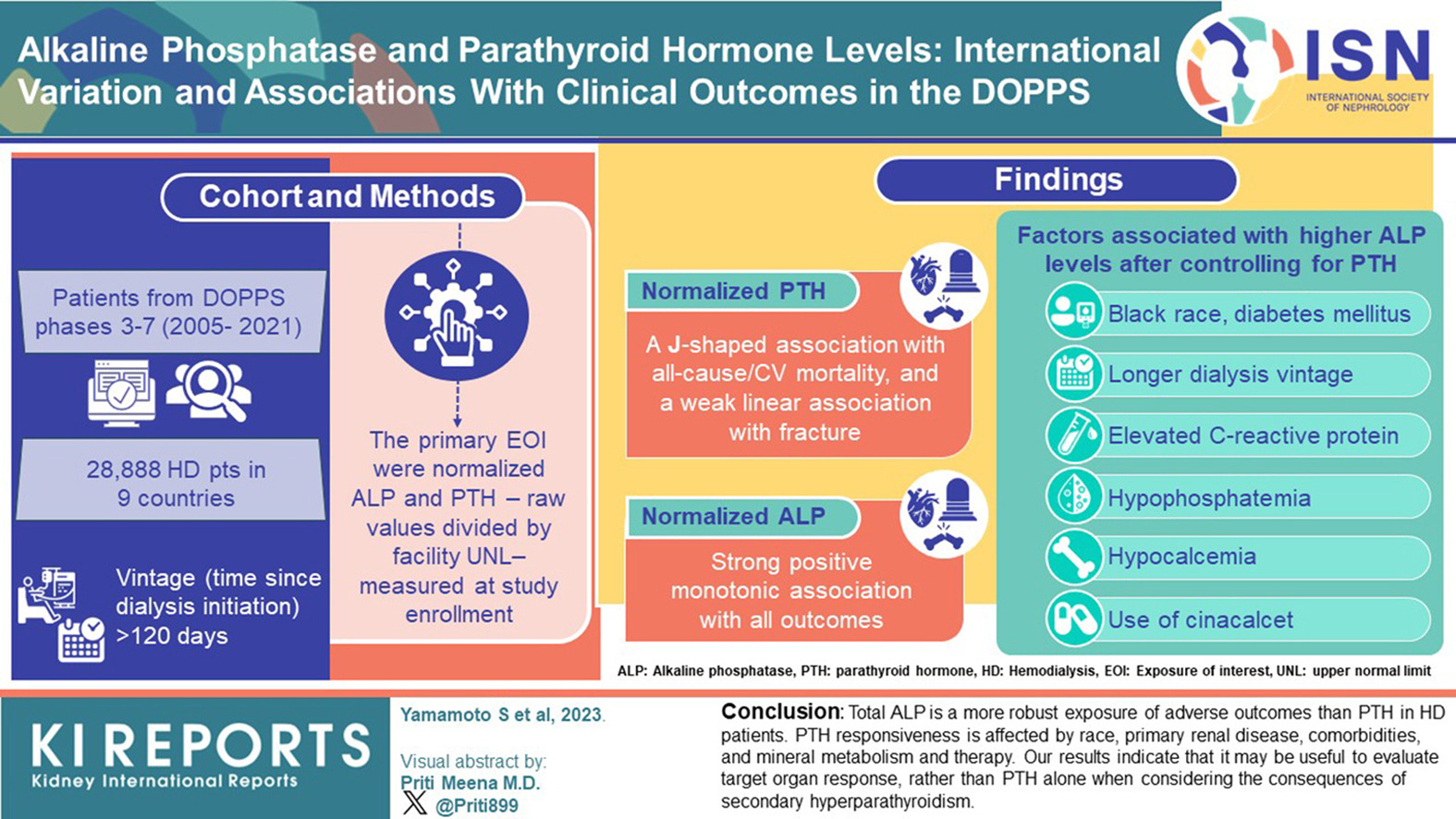Share
Share

The Dialysis Outcomes and Practice Patterns Study (DOPPS) Program at Arbor Research Collaborative for Health is pleased to share their recent publication recognized as one of the most- downloaded articles at Kidney International Reports in the past few weeks titled “Alkaline Phosphatase and Parathyroid Hormone Levels: International Variation and Associations With Clinical Outcomes in the DOPPS”. The study sheds light on the critical role of total alkaline phosphatase as a more robust indicator of adverse outcomes than parathyroid hormone in patients undergoing hemodialysis. This paper is accessible in KI Reports (read the paper here). Following are key findings regarding this study.
Key findings from this manuscript include:
28,888 Patients receiving hemodialysis (HD) in nine countries in the Dialysis Outcomes and Practice Patterns Study (DOPPS) were included in this analysis. Primary exposures of interest were normalized alkaline phosphatase (ALP) and parathyroid hormone (PTH). Cox models were used to estimate hazard ratios of all-cause or cardiovascular mortality and any or hip fracture adjusted for potential confounders. Linear mixed models were constructed to investigate the relationship between normalized ALP levels and patient characteristics.
Normalized PTH had a J-shaped association with all-cause or cardiovascular mortality, and a weak linear association with fracture. In contrast, there was a strong association with all outcomes for normalized ALP. After controlling for PTH, Black race, longer dialysis vintage, diabetes mellitus, hypocalcemia, hypophosphatemia, elevated C-reactive protein, and the use of cinacalcet were all associated with higher ALP levels.
-
Evaluating target organ response is more useful, rather than relying solely on PTH levels when considering the consequences of secondary hyperparathyroidism (SHPT). PTH responsiveness is affected by race, primary renal disease, comorbidities, and mineral metabolism and therapy. Emphasizing the importance of total ALP as a comprehensive marker may offer a more nuanced and personalized approach to managing patients receiving HD.
Understanding the variations in PTH responsiveness and recognizing the impact of Total ALP on clinical outcomes can have profound implications for patient care. This research paves the way for a more tailored and effective management strategy for individuals undergoing hemodialysis, offering health care professionals valuable insights into optimizing treatment plans.
About the DOPPS Program: Our goals are to improve the experience of patients with kidney disease by understanding current clinical practice, identifying practices associated with best outcomes, and serving as a resource for the kidney community. Started as a hemodialysis study in 1996, the DOPPS Program has followed over 200,000 persons receiving dialysis for end-stage kidney failure at more than 750 clinical sites in >20 countries. We focus on the lives of individuals with advanced non- dialysis chronic kidney disease (CKDopps) or with kidney failure treated by in-center hemodialysis (DOPPS) or peritoneal dialysis (PDOPPS).
The DOPPS Program is funded by a consortium of private industry, professional societies, and public funding sources. Please visit DOPPS.org to learn more about the DOPPS Program, our support, and opportunities for collaboration.
January 8, 2025 — Christopher Spera, President and CEO of Arbor Research Collaborative for Health, announced the election of Bryan K. Johnson, JD, MBA to the Arbor Research board of directors in 2025. Mr. Johnson was a co-founder of Insight Policy Research in 2001. His strategic development, operational management, and financial oversight led the start-up
December 5, 2024 — Arbor Research Collaborative for Health is proud to announce an innovative collaboration with the Nephrology Associates of Northern Illinois and Indiana (NANI), the largest private nephrology practice in the United States. This partnership marks a significant milestone in advancing chronic kidney disease (CKD) research and management by leveraging NANI’s extensive patient-level
Arbor Research Collaborative for Health is excited to announce a partnership with CSL Vifor to launch a multinational registry designed to capture real-world outcomes of difelikefalin (Kapruvia®), a newly-approved treatment for chronic kidney disease-associated pruritus (CKD-aP) in hemodialysis (HD) patients. Known as PARADIGM (PAn european Registry Addressing pruritus in DIalysis with a focus on Goal
The Health Resources and Services Administration (HRSA) has selected Arbor Research Collaborative for Health (Arbor Research) as one of 14 organizations who will lead the modernization of the Organ Procurement and Transplantation Network (OPTN). Arbor Research received one of the five initial efforts, focusing on improving patient safety and policy compliance systems and processes overseen